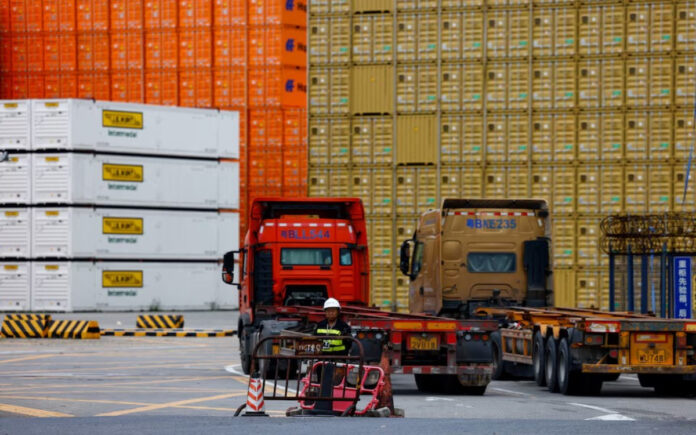Sydney: As the United States grapples with inflation concerns linked to rising tariffs, Australia is benefiting from a different trend: a surge in low-cost imports from China that is easing pressure on both consumers and policymakers.
Chinese online retail giants such as Alibaba’s Taobao and JD.COM have recently expanded into the Australian market, aiming to meet the demand for budget-friendly shopping in a country where imported goods dominate consumer purchases. Their entry comes at a crucial time, as Australia’s central bank has responded to a slowing inflation rate by cutting interest rates, citing external disinflationary forces—including the influx of Chinese imports.
In a country that manufactures few finished consumer products, platforms like Taobao are gaining traction beyond Chinese-speaking users.
“I don’t shop a lot, but if I do buy something, I will buy it online… If I can get it cheaper through Taobao, 100% I’ll buy from them,” said Jodi Clarke, a therapist in Melbourne, who made her first purchase on the platform by ordering three Hermes Kelly bag replicas for A$129 (USD $83.24).
With China’s domestic economy slowing and access to the U.S. market increasingly restricted by tariffs, Chinese factories and e-commerce companies are aggressively seeking alternative markets abroad. Australia, with its high reliance on imported consumer goods, presents a strategic opportunity.
According to Frederic Neumann, chief Asian economist and co-head of global research at HSBC, the expansion of Chinese e-commerce platforms is likely to reinforce disinflationary trends in countries like Australia.
“What the world is facing is a growing inflation divergence between the U.S. and other economies, with prices climbing in the former, and stabilising, if not outright declining, in the latter,” said Neumann.
While other Asia-Pacific economies express concern about the impact of Chinese imports on local industries, Australia’s limited domestic manufacturing capacity means cheaper imports have minimal competitive disruption. Instead, the Reserve Bank of Australia (RBA) sees them as a potential benefit.
In its latest quarterly update, the RBA said, “Because Australia has a higher share of Chinese products in most parts of its import basket compared with other economies, the redirection of tariff-affected exports is likely to place additional downward pressure on Australian import prices, especially in the short term.”
China remains Australia’s largest trading partner, with imports totaling A$110 billion last year. Chinese customs data for April showed a 9% monthly increase in exports to Australia, even as exports to the U.S. dropped by nearly 18%.
Also Read | Disney Sues to Block YouTube’s Appointment of Former Executive to Lead Sports and Media
The RBA also pointed out that the affordability of Chinese goods is unlikely to threaten existing domestic producers and may actually support certain industries, such as retail, that rely on imported inputs. Analysts at Goldman Sachs estimate that redirected Chinese imports—especially in categories like clothing, toys, and furniture—could shave 20 to 50 basis points off Australia’s headline inflation over the next one to two years.
Australia’s consumer price index stood at 2.4% in the first quarter of this year—comfortably within the RBA’s target range of 2% to 3% and a significant drop from the peak of 7.8% reached in late 2022.
A Crowded Online Market, Now More Competitive
While platforms like Temu already have a foothold in Australia’s online marketplace, others are now intensifying their efforts. Singapore-based Shein, known for its China-made fast fashion, launched its first Australia-targeted brand, Aralina, and even staged a pop-up store in Sydney earlier this month.
Alibaba, once a low-profile player in cross-border e-commerce, has recently ramped up global expansion—including in Australia. JD.COM followed with its own Australian site launched in March. Initially targeting Chinese-speaking users abroad, these platforms have pivoted to English-language services in response to trade disruptions stemming from U.S. tariff policy.
The result is a broader push into English-speaking markets. Taobao now offers an English app and is promoting the upcoming “618” shopping festival in Australia, featuring free shipping on apparel purchases above 249 yuan (USD $34.25).
Australian users find the app convenient, with built-in translation tools aiding interaction with sellers. Although shipping costs remain a consideration, shoppers still find Chinese platforms more affordable than many local alternatives.
Also Read | South Korea Refutes Reports of US Troop Withdrawal Discussions
The popularity of Chinese e-commerce has also spilled over to social media. The “Taobao haul” trend is gaining traction on TikTok among young Australian consumers eager to showcase their budget finds.
Australian shopper Jessica Cox detailed her Taobao purchases on social media, including knockoffs of AirPods Max, a Dyson vacuum cleaner, and New Balance sneakers.
“I thought I’d give it a try as a lot of people were saying they are pretty close to being mirror fakes,” she said.
“I thought, what do I have to lose?”



